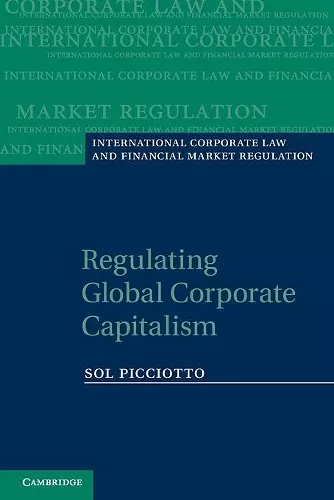Regulating Global Corporate Capitalism
Format:Paperback
Publisher:Cambridge University Press
Published:12th May '11
Currently unavailable, and unfortunately no date known when it will be back

This book explains the law and regulation of global economic governance, focusing especially on international business.
Sol Picciotto overturns common myths about the unregulated market economy, showing how large corporations are closely linked with states and how regulation generally reinforces corporate power. Multinational corporations exploit jurisdictional interactions especially using havens and the offshore system, and the complex networks of law and regulation thereby forged are analysed.This analysis of how multi-level networked governance has superseded the liberal system of interdependent states focuses on the role of law in mediating power and shows how lawyers have shaped the main features of capitalism, especially the transnational corporation. It covers the main institutions regulating the world economy, including the World Bank, the IMF, the WTO and a myriad of other bodies, and introduces the reader to key regulatory arenas: corporate governance, competition policy, investment protection, anti-corruption rules, corporate codes and corporate liability, international taxation, avoidance and evasion and the campaign to combat them, the offshore finance system, international financial regulation and its contribution to the financial crisis, trade rules and their interaction with standards especially for food safety and environmental protection, the regulation of key services (telecommunications and finance), intellectual property and the tensions between exclusive private rights and emergent forms of common and collective property in knowledge.
'This book provides insight into global corporate capitalism's development and its contemporary governance … the argument is carefully constructed through detailed accounts of salient developments in the history of the global economy over a substantial period of time. That such an enormous area of investigation is covered in a meticulous manner without any loss of focus by the author (or indeed this non-specialist reader) is testament to both the depth of knowledge that is conveyed and the manner in which it is expressed … the book succeeds within its own terms: in providing a historical contextualization of the central features and institutions of the regulation of contemporary corporate capitalism; in highlighting the role of lawyers in shaping its development and contemporary governance; and in raising concerns regarding its implications for legitimacy and accountability, aims which are accomplished expertly.' Journal of Law and Society
ISBN: 9780521181969
Dimensions: 229mm x 154mm x 28mm
Weight: 940g
602 pages